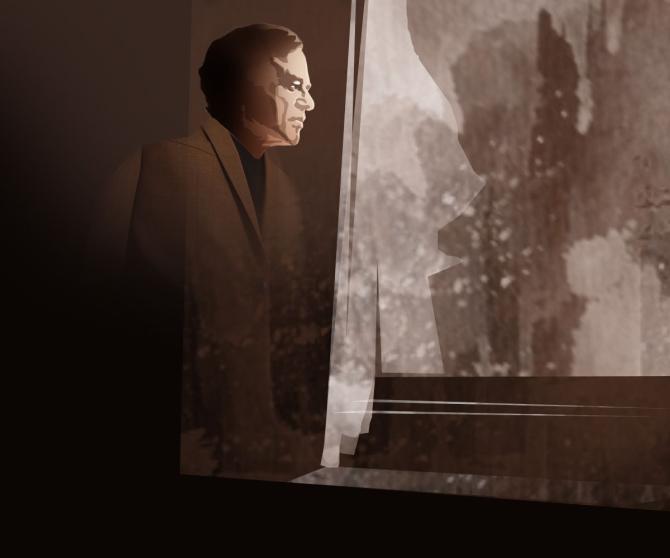Within six months, outlets carrying Vicks jumped from 60,000 pharmacies to 750,000 general stores.
The trade boycott collapsed.
Consumers were happy, finding Vicks now at every street corner.
A fascinating excerpt from Gurcharan Das's Another Sort of Freedom.

I was now 37 and sitting at the top of the heap. I had become CEO of Richardson Hindustan Ltd, the company where I had started at the bottom. I may have got to the top, but I wasn't sitting pretty.
The company was in serious trouble, a real mess. I didn't know to which port we were sailing; no wind was favourable.
The socialist government had instituted severe price controls on medicines, threatening to bankrupt us. Our labour force was hostile, coming out of a 77-day strike. The chemists' association had just announced a boycott of our products to force higher trade margins.
With sales plunging to zero, we might go bust. I called a meeting of the management committee.
Gloom filled the room when I finished outlining our ominous situation. I suggested a free-flowing 'brainstorming', a novel idea that left my colleagues cold. They were suspicious. I might have a hidden agenda before I plunged in the knife.
The brainstorming was a disaster. I chalked it to our differing mindsets. Theirs was more traditional, hierarchical style; mine was consultative, participative, maybe because I had grown up in democratic America. Nevertheless, I wasn't deterred and called for a second brainstorming session.
This time, I did a better job. They had also begun to trust me a bit more. I guided the discussion more confidently, focusing sharply on the key issues. Ideas began to flow.
At one point in the flowing stream, the Gujarati head of marketing said almost absent-mindedly, 'What if Vicks Vaporub had been an Ayurvedic medicine, not a Western drug?' But behind the 'what-if' was a hope -- Ayurvedic products did not fall under price control.
Then, the Tamil head of R&D spoke, as though he was speaking to himself: 'Vaporub's ingredients are natural. I wonder if they're in the Ayurvedic formulary.'
The Marwari company secretary thought it worth confirming if Ayurvedic products were indeed free from price control.
The Punjabi sales manager wanted to check if Ayurvedic products were limited to pharmacies or sold by general merchants.
The Bengali finance manager, ever cautious, felt that even if Vaporub's ingredients were in the formulary, it would be illegal to make the switch. Would the government ever allow it?
The wishful Gujarati, who had started all this, confessed that the idea had been put into his head by an official of the Gujarat government.
Someone announced a headline from the Times of India: '100-Year-Old American Product Becomes a 2000-Year-Old Indian Medicine!' Everyone laughed. The ice had been broken.
Everyone seemed to know what to do.
The R&D man rushed to the Bombay University library to check if Vaporub's ingredients were in the ancient formulary.
The finance manager went off to the lawyers' office to confirm if Ayurvedic products were indeed free of price control.
The company secretary called our government-relations man in Delhi to check if Vaporub's registration could be changed.
The sales manager was off to the bazaar to ascertain which sort of stores sold Ayurvedic products.
We met in the evening. There were smiling faces. It was a 'yes' on all counts. All of Vaporub's ingredients were in the formulary; Ayurvedic products were not price-controlled. We looked at each other in disbelief.
The advice from Delhi was not to ask for a change in registration but to make an application for a new product and make the switch only after the approval.
Over the next few days, we worked day and night, preparing a dossier, backed by endorsements from Ayurvedic experts.
When the application landed on his desk, the regulator practically fell off his chair. He had guessed what we were up to, but he couldn't stop us--it was all perfectly legal.
After weeks of prodding daily, the authorities handed us the prized licence to manufacture an Ayurvedic rub.
From that day onwards, the factory stopped manufacturing the old Vaporub. Our Maharashtrian purchase manager ordered labels for the new Vaporub. The sales manager recalled the entire inventory from the market for relabelling.
Two weeks later, shiny bottles of 'All Natural Ayurvedic Vicks Vaporub' were sitting proudly on store shelves. Nothing had changed, except our profits. They soared. The sales force began to expand distribution to the non-drug trade.
Within six months, outlets carrying Vicks jumped from 60,000 pharmacies to 750,000 general stores. The trade boycott collapsed. Consumers were happy, finding Vicks now at every street corner.

With higher prices and better costs, we invested aggressively in marketing. Our after-tax profits rose from 1 per cent to 14 per cent of sales. Soon, we were a blue chip on the Bombay Stock Exchange as the share price zoomed from Rs 30 to Rs 400 over the next eighteen months. (We were owned only 40 per cent by the American company; the balance 60 per cent was widely spread among the Indian public.)
Having anticipated this outcome, we had offered shares of the company to all 1,248 employees, including factory workers, secretaries and cleaning staff. All shared in the company's prosperity and many ended up buying a home from their capital gains.
This had not been easy, since no one had heard of stock options in those socialist days. The controller of capital issues thought it a scam -- employees trying to steal the company's money. However, we prevailed in the end and were allowed to offer 5 per cent of the share capital to employees.
Around this time, I got a call from Delhi, inviting me to an industry government roundtable. With all the goings-on in the company, I was reluctant to accept the invite. But when I learnt that a breakfast with Mrs Gandhi was on the cards, I was easily persuaded.
The next morning, we were ushered into the prime minister's garden. Mrs Gandhi was smiling in an elegant grey-and-pink cotton sari. She was surrounded by spring flowers, and it was hard to believe that this amiable woman was the lapsed dictator who had broken Pakistan into two.
During question hour, a few sycophants from the industry rose to eulogize her achievements. There was embarrassed silence. I decided to take my chance.
I asked her about three of her prized policies: Why did we need licensing when competition would do a better job of allocating resources?
Two: Why were our tax rates so high, rising to 98.75 per cent at the top?
Three: Why didn't we follow the Asian tigers by opening our economy and exporting labour-intensive goods, rather than insisting on making everything uncompetitively at home?
Thinking I was a bit unhinged, Mrs Gandhi threw me a look of mock sympathy and said, 'We'll need a day-long seminar for this young market wallah's questions.' There were sniggers. She decided to indulge me, nevertheless.
Since India was a poor country, she said, it didn't need frivolous cosmetics and luxuries; licensing ensured we produced only necessities.
Two, high taxes for the rich, low taxes for the poor -- this was simply a matter of being equitable.
Three, Indian industry was in its infancy and could not compete in the world. Since we did not export, India did not have the foreign exchange to pay for imports; hence, the only alternative was to make as much as possible at home.
It was the typical defence of Fabian socialism. She had been well trained by her Marxist economists. I was about to jump up and rebut her arguments when my host signalled me to sit down.
India's private industry did not want to lose the great leader's goodwill. He launched instead on a never-ending, apple-polishing tribute to Mrs G's leadership.
Thus, amid shining marigolds, she had preserved that morning three myths of the Licence Raj. India would have to wait almost a decade before it would be liberated by the reforms of 1991.
Excerpted from Another Sort of Freedom by Gurcharan Das, with the kind permission of the publishers, Penguin Random House India.
Feature Presentation: Ashish Narsale/Rediff.com












 © 2025
© 2025